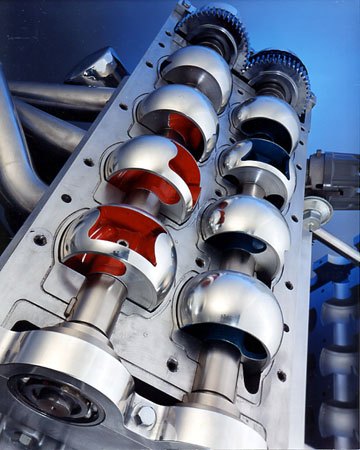Coates Spherical Rotary Valve System – Let the Rivet Counting Begin!
According to the official website, the Coates Spherical Rotary Valve System creates "a quieter engine with higher specific power output and longer life than conventional poppet valve engines due to better 'breathing' capability and higher speed capability." In fact, it's "the single most significant development in engine technology in the past thirty years." Not being the most mechanically-minded pistonhead on the planet, I asked Sajeev Mehta to check it out: "Its a logical extension of innovations like roller rockers: reduced friction, more power, efficiency etc. The general feel I got from people who know more than me: sealing a spherical valve isn't gonna work for a production car. Today's engines have to last over 100k miles without any trouble, and engine "blow by" will be even worse here… and don't even think about pressurizing these valves with a turbo/supercharger/ Good night! As for their claim of their valves not needing oil. Strap on an A/C compressor: sit in traffic in 100 degree weather on a heat-soaked hunk of tarmac and those valves will be begging for extra lubrication. The big red flag for me: their they compared it to a regular engine without an EGR valve. That's like challenging Carl Lewis to a 100m race and making him do it barefoot on hot asphalt. Everyone uses EGR valves for a good reason; they reduce NOx (the third row on their chart) emissions by something like 70% or more. "On the exhaust stroke the poppet exhaust valve stems allow "back" pressure through the valve guides into the engine casing. This pressure is then redirected through the fuel induction system and in turn is reburned in the engine creating yet more hydrocarbons, carbon dioxide and carbon monoxide." Except that happens on high mileage motors with worn valve guides/springs (valves snap shut plenty fine when new). It took 150k miles for my 5.0 Ford to get weaker/slower/dirtier from valvetrain age. Newer engines are even better at valvetrain durability for many reasons. I seriously question if the Coates engine will fare much better after that type of punishment. I'm skeptical, but would change my tune with better info. EPA-style tests that carmakers do wouldn't hurt."
More by Robert Farago
Latest Car Reviews
Read moreLatest Product Reviews
Read moreRecent Comments
- Marcr My wife and I mostly work from home (or use public transit), the kid is grown, and we no longer do road trips of more than 150 miles or so. Our one car mostly gets used for local errands and the occasional airport pickup. The first non-Tesla, non-Mini, non-Fiat, non-Kia/Hyundai, non-GM (I do have my biases) small fun-to-drive hatchback EV with 200+ mile range, instrument display behind the wheel where it belongs and actual knobs for oft-used functions for under $35K will get our money. What we really want is a proper 21st century equivalent of the original Honda Civic. The Volvo EX30 is close and may end up being the compromise choice.
- Mebgardner I test drove a 2023 2.5 Rav4 last year. I passed on it because it was a very noisy interior, and handled poorly on uneven pavement (filled potholes), which Tucson has many. Very little acoustic padding mean you talk loudly above 55 mph. The forums were also talking about how the roof leaks from not properly sealed roof rack holes, and door windows leaking into the lower door interior. I did not stick around to find out if all that was true. No talk about engine troubles though, this is new info to me.
- Dave Holzman '08 Civic (stick) that I bought used 1/31/12 with 35k on the clock. Now at 159k.It runs as nicely as it did when I bought it. I love the feel of the car. The most expensive replacement was the AC compressor, I think, but something to do with the AC that went at 80k and cost $1300 to replace. It's had more stuff replaced than I expected, but not enough to make me want to ditch a car that I truly enjoy driving.
- ToolGuy Let's review: I am a poor unsuccessful loser. Any car company which introduced an EV which I could afford would earn my contempt. Of course I would buy it, but I wouldn't respect them. 😉
- ToolGuy Correct answer is the one that isn't a Honda.


































Comments
Join the conversation
Naw, the "next big thing" will be the return of the Willys-Knight sleeve valve engine!
The latest "Coates HOT OF THE PRESS" China will require - if everything pans out - that all engines will be Coates engines. What next? This should happen in 2 weeks - ad infinitium.